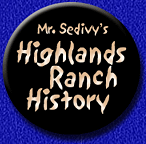|
Highlands Ranch High School - Mr. Sedivy
Highlands Ranch, Colorado

- Advanced Placement European
History -
Class Activities / Simulations
Holocaust
- The Trial of Adolf Hitler
Introduction
Few individuals in history have evoked the interest, fear or contempt
as has the German dictator Adolf Hitler. His rise to power during
the 1920s and 1930s, his authoritarian Nazi Germany, and his prosecution
of World War II have all made him an intriguing study in power politics
and megalomania.However, it is Hitler's racial policies and his persecution
of ethnic minorities, in particular Europe's Jewish population, that
have made one of histories most notorious figures.

This activity is intended to allow students to explore
first hand the Holocaust that occurred in Europe from 1939-1945 and
to determine the level of personal responsibility Adolf Hitler bears
for the systematic murder of more than 6 million people.
Objectives
This activity is intended to:
 introduce students to the basic facts of the Holocaust.
introduce students to the basic facts of the Holocaust.
 allow students to explore the primary sources, documents and other
sources of information relevant to Nazi Germany and the Holocaust
during World War II.
allow students to explore the primary sources, documents and other
sources of information relevant to Nazi Germany and the Holocaust
during World War II.
 develop student research skills and skills relating to the interpretation,
analysis and use of primary and secondary source documents.
develop student research skills and skills relating to the interpretation,
analysis and use of primary and secondary source documents.
 provide students the opportunity to role play characters in a trial
setting to determine Hitler's personal responsibility for the Holocaust.
provide students the opportunity to role play characters in a trial
setting to determine Hitler's personal responsibility for the Holocaust.
Time
Two weeks total time, one week to provide basic background and classroom
instruction and one week for preparation for and conducting the simulation
trial. In addition students will be expected to work as needed outside
of class.
Materials
The student instructions for the simulation "Trial of Adolf Hitler"
and relevant documents. (See additional handouts).
In addition, because this assignment is intended to
both educate students about the Holocaust and enhance their research
and analytical skills a wide variety of materials may be used including
documents, video material, photographs etc. available to them through
their school media center and other sources. (Please see additional
handouts for basic material needs and ideas.).
Preparation
Through general course work students should be fully aware of the
following:
 World War I and the terms of the Versailles Treaty
World War I and the terms of the Versailles Treaty
 the inter-war years and Germany's failed Weimar Republic
the inter-war years and Germany's failed Weimar Republic
 the origins and basic political and racial philosophy of National
Socialism
the origins and basic political and racial philosophy of National
Socialism
 general background on anti-Semitism in the context of European history
general background on anti-Semitism in the context of European history
 appeal of Nazism within the historical context of Germany
appeal of Nazism within the historical context of Germany
 Hitler and Nazism's rise to power in and during the 1930s
Hitler and Nazism's rise to power in and during the 1930s
 significant political/racial policies and events leading up to 1939
significant political/racial policies and events leading up to 1939
 introductory information about World War II and the Holocaust
introductory information about World War II and the Holocaust
Students will be making a detailed study and presentation
on the myriad events, issues and opinions regrading the implementation
of the "Final Solution of the Jewish question" and resulting Holocaust
during World War II.
Procedure
Day 1
Students will draw roles that include the five-member tribunal, two-member
prosecution and defense teams, the defendant Adolf Hitler, and witnesses
for both the prosecution and defense. (Depending on the size of the
class adjustments may need to be made in the number of witnesses assigned
to the prosecution and defense teams or a decision may be made to
go with a trial by a jury.)
General instructions will be distributed to and reviewed
with the class. Special instructions for members of each team will
also be handed out (i.e. judges, attorneys, witnesses). The teams
should then establish more specific roles for all students to assume
and research (i.e. nationality of justices, character / roles of witnesses,
role of prosecutors / defense attorneys, etc.).
Days 2-3
Students will be separated into three separate teams (justices, prosecution
and witnesses, defense, defendant and witnesses) and allowed two full
class periods to work with prepared documents and conduct basic research
about the Holocaust.
Day 4
Prosecution and defense teams make available general case outlines
to each other and make defendant and witnesses available for simple
interviews by the opposing team. Justices may sit in on these sessions.
This step is intended to allow each team some opportunity to anticipate
the strategy / tactics to be pursued in the course of the simulation
trial and develop simple counter attacks.
Day 5
Students conduct the simulated trial of Adolf Hitler in class. All
additional assignments are due the day of the simulation trial.
Follow-Up
The day after the simulation trial, students will be debriefed as
to the specific roles they played, the general conduct of the trial,
salient issues raised by the prosecution and/or defense, and the overall
impact the activity had on their knowledge/understanding of Hitler,
Nazism and the Holocaust.
Resources
The following may be helpful in developing background information:
Books
Bullock, Alan. Hitler: A Study in Tyranny. Harper
and Rowe. 1971. (An extremely complete and informative biography of
Adolf Hitler, Bullock examines the early life and political career
of the most infamous dictator of the twentieth century. Special attention
is given to the evolution of Hitler's political and racial philosophies
and psychological make-up of the man who led Germany and the world
into the most destructive war in human history.)
Gilbert, Martin. The Holocaust: A History of the
Jews of Europe During the Second World War. Henry Holt and Co.
1985. (Martin Gilbert has written a definitive history of the Holocaust
that occurred in Europe between the years 1933 and 1945. Calling on
sources from German documents to personal accounts of participants
and survivors, he chronicles the development of the persecution and
extermination of European Jewery. though difficult to read, this book
offers perhaps the most complete history of the attempted destruction
of an entire people.)
Sher, Linda. South Carolina Voices: Lessons from
the Holocaust. South Carolina Department of Education. 1992. (Linda
Sher draws on a wealth of information to provide a comprehensive view
and valuable lessons on the Nazi attempt to exterminate Europe's Jewish
population during the 1930s and 1940s. Using a wide variety of personal
accounts of active participants and Jewish survivors, Sher creates
effective lessons that will help students develop a sense of the enormous
tragedy that was the Holocaust.)
Possible Video Presentations
 Night
and Fog Night
and Fog  World at War: Genocide (Episode 21)
World at War: Genocide (Episode 21)
 Rise
and Fall of the Third Reich Rise
and Fall of the Third Reich  Adolf Hitler
Adolf Hitler
Additional Relevant Information at
Mr. Sedivy's Site:
Liberating Dachau
| World War II - Dachau Concentration Camp
Complex |
| Unanswered Questions: The Railroad Boxcars
|
| I Company Recollections and Quotes
|
| Liberating Dachau: The 42nd Division at
the Jourhaus |
Dachau, Germany
| Dachau: WWII Concentration Camp
Memorial | 2 |
3 |
World War II Quotes
| Quotes from Europe and Asia - 1900s
| Winston Churchill |
| American Quotes from the Early 1900s and
World War I |
| US 20th-Century and World War II Quotes
|
Back to top of page
- AP Modern European History
in Depth -
Lecture Notes and Further Reading
| Methods and Rules for a Prince: How Should
a Prince Rule? |
| Borg vs Hick: Theories on Jesus and Christianity
|
| Kant's Epistemological Model and Religious
Pluralism |
Related Information
| Poems
and Prose From the 8th - 15th Centuries | 1
| 2 |
| Marseillaise, the National Anthem
of France:
A Modern-day Controversy | Sacré
Phew! |
| French Culture: Historical Champagne and
Wine Trivia |
Famous
Modern European History Quotes
| Index of Quotes by Speaker / Historical
Period |
| Famous Quotes from the Dark and Middle Ages
|
| Relevant Quotes from the Reformation and
Renaissance |
| Quotes from England: 15th, 16th and 17th
Centuries |
| Enlightenment and Scientific Revolution Quotes
| Voltaire |
| Quotes from the French Revolution and Napoleon
Era |
| Modern European History Quotes from the
1800s |
| US 20th-Century and World War II Quotes
|
AP Class Activities
| Play the Role of Philip II |
| Visual Interpretations - French Revolution
Art |
| "Ism" Maps of Europe and Asia
|
| Industrial Revolution: England's Advantage
|
| Marx and Tocqueville | America's
Entry Into World War I |
Trials - Simulations
| Trial of Martin Luther | Trial
of Adolf Hitler |
Helpful Information for Students
| AP Essay Writing Skills |
| Student-Developed Class Presentation Topics
|
Debate Information
| Guide: Individual Debate Position |
Debate Self Evaluation |
Debates
| Existence of God | Catherine
the Great or Frederick the Great |
| Locke - Hobbes | Voltaire
or Rousseau |
Additonal Course Info / AP Class Policy
| AP European History Syllabus: Quarter 1
| Quarter 2 | Quarter
3 |
| Writing Assignments, Exams, Critical Book
Reviews, More |
| AP Booklist and Fees |
|




![]() 9375 South Cresthill Lane
9375 South Cresthill Lane ![]() Highlands Ranch, Colorado 80126
Highlands Ranch, Colorado 80126 ![]() 303-471-7000
303-471-7000
